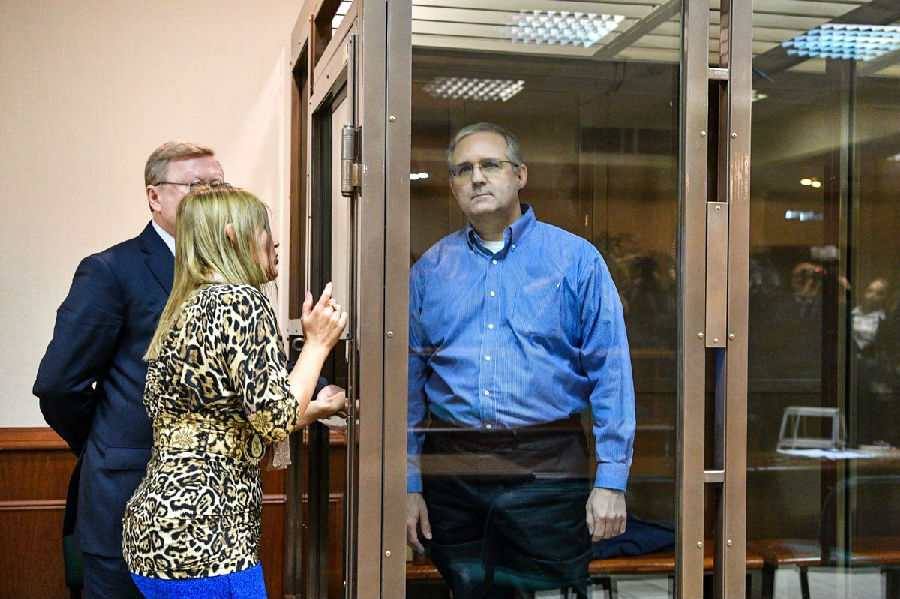Judy Woodruff: Two Americans overseas were convicted in controversial court cases watched closely here and around the world. Nick Schifrin now looks at former Marine Paul Whelan in Russia, sentenced to 16 years in prison, and the renowned journalist Maria Ressa in the Philippines.
Paul Whelan: So, it is what it is.
Nick Schifrin: Today, a defeated Paul Whelan listened from a glass cage to what his lawyer called a sentence without evidence and a judgment without translation.
Man: Nothing's translated, Your Honor. I don't know what you said.
Nick Schifrin: Outside the courthouse, U.S. Ambassador to Russia John Sullivan called Whelan's trial a sham.
Ambassador John Sullivan: It's a mockery of justice. If they can do it to Paul, they can do this to anyone.
Nick Schifrin: Whelan is a former police officer and Marine who loved to travel. He was arrested in Moscow in December 2018, and accused of spying, a charge he has consistently denied. He turned 50 and spent more than 500 days in prison, and he's made his case through bars and jostling journalists.
Paul Whelan: Although Russia says it caught James Bond on a spy mission, in reality, they abducted Mr. Bean on holiday. I'm the victim of an assault by a prison agent, and that's something that you need to cover.
Nick Schifrin: David Whelan is Paul's twin brother. Do you believe your brother has gotten a fair trial?
David Whelan: Paul has been given a terrible deal with the Russian system, both from being entrapped at the very beginning, not being able to have translated evidence, not being able to have witnesses appear. The whole thing was a railroad.
Nick Schifrin: Moscow says it's interested in a prisoner swap for Konstantin Yaroshenko, a former military pilot convicted by a U.S. court of conspiracy to smuggle cocaine or the notorious arms dealer Viktor Bout, convicted of conspiracy to kill U.S. citizens and officials. Last November, senior U.S. State Department official Julie Fisher rejected the swap.
Julie Fisher: There is no need to discuss a swap, particularly for someone who was a convicted criminal.

David Whelan: I don't think it's ever been a question that that was what he was being held for. I would be very conflicted about Paul, being a tourist, even though the Russians called him a spy, being exchanged for a Russian arms dealer, a Russian drug dealer.
Nick Schifrin: Five thousand miles away, Maria Ressa walked out of a trial today she also called a sham. The Filipina-American journalist is a former CNN correspondent and started the independent news outlet Rappler.
Maria Ressa: We're at the precipice. If we fall over, we're no longer a democracy. Are we a democracy or not? Let us do our jobs.
Rodrigo Duterte: There will be no let up in this campaign.
Nick Schifrin: Since 2016, Filipino President Rodrigo Duterte has carried out a war on drugs that the U.N. calls an extrajudicial murderous crackdown that killed 12,000. He's also waged war on the press and dissent, shutting down the country's largest broadcaster just last month. Rappler repeatedly criticized Duterte and linked a prominent businessman to illegal drugs. Even though Ressa didn't edit that article, and even though it was published eight years ago, she could face six years in prison.
Maria Ressa: Are we going to lose freedom of the press? Will it be death by 1,000 cuts? Or are we going to hold the line, so that we protect the rights that are enshrined in our constitution?
Steven Butler: It looks like a targeted attack on a single journalist who has been, written a lot, or done a lot of highly critical coverage of the Duterte administration. That is a threat to every journalist in the country.
Nick Schifrin: Steven Butler is the Asia coordinator for the Committee to Protect Journalists. He says the threat to journalism in Asia goes well beyond the Philippines.
Steven Butler: Many governments have activated anti-terror laws or libel laws, fake news laws. So, this is part of a broad trend that has forced press freedoms further into retreat from what we have seen in recent years.
Nick Schifrin: Whether through jailing journalists or hostage diplomacy, two Americans have become the targets of governments pursuing their agendas by manipulating justice. For the "PBS NewsHour," I'm Nick Schifrin.












